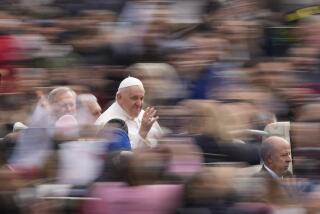ASIA : Pope’s Remarks on Buddhism May Mar His Sri Lanka Visit
- Share via
NEW DELHI — Pointed remarks about Buddhism, penned by Pope John Paul II, are igniting religious passions in Sri Lanka that threaten to disturb the pontiff’s visit to the predominantly Buddhist island nation next week.
On Wednesday, trying to defuse the dispute as he set off on his 11-day tour of Asian and Pacific nations, John Paul proclaimed his “profound respect and sincere esteem” for Buddhism.
But those ecumenical assurances from the head of the Roman Catholic Church, uttered at his weekly general audience at the Vatican, seemed unlikely to calm the storm.
Although the causes were still murky, a fire broke out in St. Cecilia’s Roman Catholic Church in the Raddoluwa housing colony 15 miles north of the Sri Lankan capital, Colombo, on Tuesday. Local residents said they doused the fire in the empty sanctuary after seeing smoke.
Early the next morning, unidentified men poured kerosene over statues of Lord Buddha in a temple two miles away and set them on fire. Police said the temple priest had been among the most outspoken opponents of the Pope’s visit.
Frank Silva, inspector general of police, denied there was any link between the incidents, and it was not certain they were connected to the Pope’s pending visit. But local media did not report the church fire, apparently because it might further stoke religious tensions.
A lush, beautiful island off southern India, Sri Lanka was meant to be the joyous final stop on the Pope’s four-nation tour.
But comments in his recently published book, “Crossing the Threshold of Hope,” led some sections of the country’s Buddhist community to angrily oppose his coming.
In the book, the 74-year-old pontiff contends that nirvana, considered by Buddhists to be a condition of ideal detachment and perfect blessedness, is really “a state of perfect indifference with regard to the world.”
“Buddhism is in large measure an ‘atheistic’ system,’ ” the Pope says in his book, an international best-seller. “We do not free ourselves from evil from the good that comes from God; we liberate ourselves only through detachment from the world, which is bad.”
Some of Sri Lanka’s most prominent Buddhist monks say they will boycott the pontiff’s visit unless he makes a personal apology.
Even the main event bringing John Paul to Sri Lanka has become controversial. On Jan. 21, at a seaside Mass in Colombo expected to be attended by up to half a million people, he will beatify Father Joseph Vaz, a Goanese missionary who worked among the island’s Catholics in the 17th Century.
Some Buddhists claim that Vaz committed atrocities against Buddhist monks and priests. They also object that the clergyman is being awarded a title that translates as Bhagyavanta, or supremely divine--an honor they say by rights is reserved for Buddha alone.
*
As the Pope’s trip loomed, Cardinal Angelo Sodano, the Vatican secretary of state, made an attempt at damage control in the guise of a public statement addressed to the Buddhist clergy. “We are all truly saddened that they have felt offended,” he said.
But some were not assuaged. “The Pope has made an incorrect interpretation of Buddhism,” said Gallege Punyawardana, secretary of Sri Lanka’s Federation of Buddhist Organizations. “They (the Vatican) are not withdrawing it but have said they feel sorry. This is not acceptable.”
So far, President Chandrika Kumaratunga, a Buddhist like most Sri Lankans, has stayed out of the dispute. Her government was happy to secure a two-week truce with Tamil rebels that reduces the likelihood of incidents during the Pope’s visit and should allow Tamil Christians from the rebel-held Jaffna peninsula to attend the Mass in Colombo.
But in part because of passions unleashed by John Paul’s book, Sri Lankan authorities are taking no chances. More than half of the island’s 60,000-strong police force and handpicked units of the armed forces are to be deployed in Colombo in advance of his arrival.
More to Read
Sign up for Essential California
The most important California stories and recommendations in your inbox every morning.
You may occasionally receive promotional content from the Los Angeles Times.













